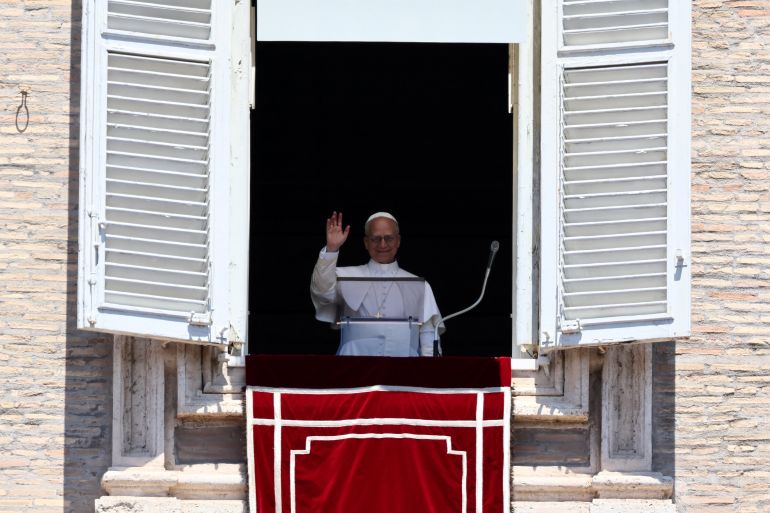Pope Leo prays for China’s Catholics, a thorny issue in his papacy
Ties with China remain sensitive within the Catholic Church over a 2018 deal between the Holy See and Beijing.

Published On 25 May 202525 May 2025
Newly elected Pope Leo XIV has asked for prayers for China’s Catholics in his first reference to one of the most contentious issues that the Catholic Church and his papacy face in the arena of geopolitics.
Speaking on Sunday from the window of the Vatican’s Apostolic Palace, the pontiff recalled the World Day of Prayer for the Church in China, which falls each May 24 – a feast initiated by Pope Benedict XVI.
Recommended Stories
list of 3 items
What might follow from Pope Leo XIV’s election?
end of list
“In the churches and shrines of China and throughout the world, prayers were raised to God as a sign of concern and affection for Chinese Catholics and their communion with the universal church,” Leo said to about 35,000 faithful.
The pope hoped the prayers “obtain for them and for us the grace to be strong and joyful witnesses of the Gospel, even in the midst of trials, to always promote peace and harmony”, he said.
Pope Benedict XVI, who headed the church from 2005 until 2013, established the feast as part of his efforts to unify China’s estimated 12 million Catholics, who were divided between an official, state-controlled church that didn’t recognise papal authority, and an underground church that remained loyal to Rome through decades of persecution.
Advertisement
Ties with China remain a deeply sensitive issue within the church as some clergymen reject a 2018 deal between the Holy See and China that gave Beijing a say in the appointment of Catholic bishops there, since Catholics were repressed by the Communist Party.
The agreement was aimed at uniting the flock, regularising the status of seven bishops who weren’t recognised by Rome, and thawing decades of estrangement between China and the Vatican.
While details of the agreement were never released, Pope Francis insisted he retained veto power over the ultimate choice.
Critics, particularly on the Catholic right wing, believed Francis had caved to Beijing’s demands and sold out the underground faithful in China. The Vatican has said it was the best deal it could get, and it has been renewed periodically since then.
Pope Leo will have to decide whether to continue renewing the accord. There have been some apparent violations on the Beijing side, with some unilateral appointments that occurred without papal consent.
The issue came to a head just before the conclave that elected Leo, when the Chinese church proceeded with the preliminary election of two bishops, a step that comes before official consecration.
The Vatican has been working for years to try to improve relations with China that were officially severed over seven decades ago when the Communists came to power.
Relations had long been fraught over China’s insistence on its exclusive right to name bishops as a matter of national sovereignty, while the Vatican insisted on the pope’s exclusive right to name the successors of the original Apostles.
Advertisement
